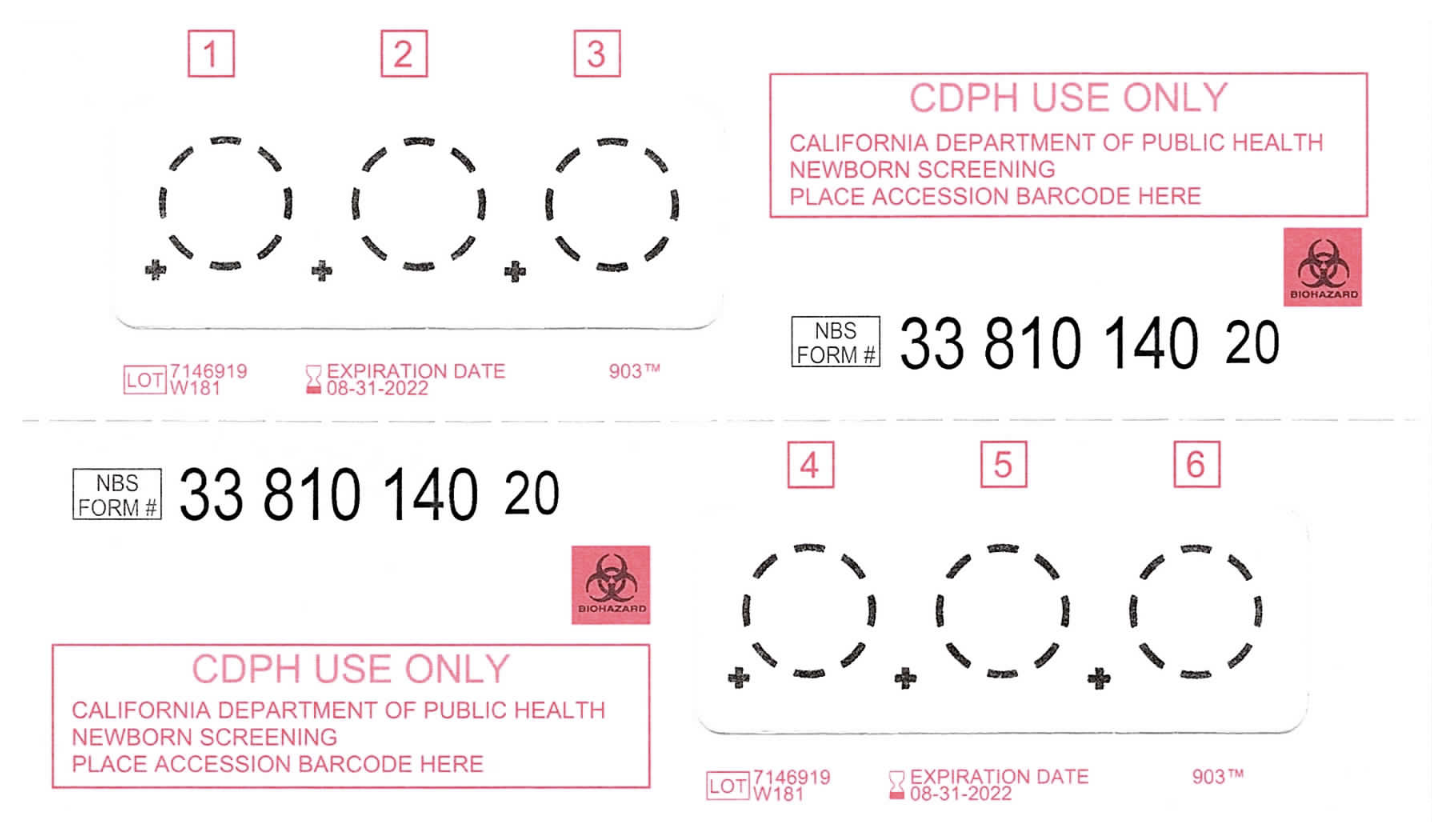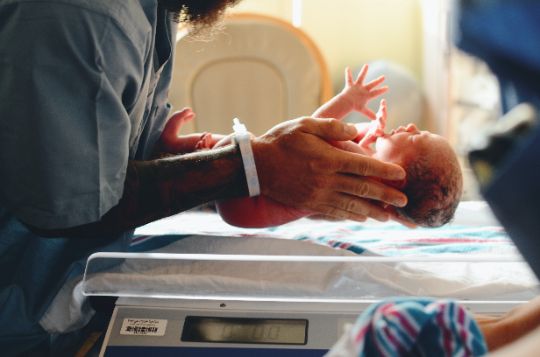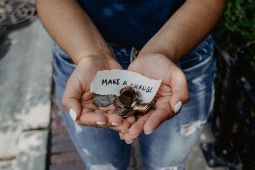
Guide to your baby's genetic privacy
Is your child's DNA being stored by the state of California? If your child was born in California after 1983, the answer is likely YES!
Each year in California, hundreds of thousands of newborn screenings are performed to detect genetic conditions. The blood specimen and information obtained during the testing process become the property of the state. California indefinitely stores the residual blood samples and makes them available to third party researchers without the consent of parents.These blood samples contain a wealth of personal information, from eye and hair color to predisposition to diseases. This genomic data is highly distinguishable and cannot be truly de-identified. Additionally, many people are concerned about law enforcement using residual newborn blood samples in their search for suspects through Investigative Genetic Genealogy.
That’s why CHCA sponsored SB 625 in the 2023/2024 Legislative Session and why we are proposing a new bill in 2025 that would:- Codify current California regulations such as the requirement that all birth attendants provide a copy of CDPH’s "Important Information for Parents" and that parents who have initially allowed a sample to be stored can later request the sample be destroyed.
- Require the department to destroy samples within 30 days if requested to do so.
- Require providers to obtain written acknowledgment from the parent or guardian that they have received information regarding the storage, retention, and use of the newborn child’s blood sample for medical research on a standard form.
- Allow parents to opt out of the storage and confidential use of the sample for research purposes before the sample is drawn.
- Prohibit the specimen from being released for law enforcement purposes.
CHCA sponsored bill, SB 1099, has been signed into law and will bring much needed transparency to the California Biobank where the residual blood samples are stored. For more information about SB 1099, go here.
If you want to see bills like these become law, we need your financial help.
WHAT YOU CAN DO TO PROTECT YOUR BABY’S GENETIC PRIVACY
Get Involved

requesting the blood specimen card be destroyed
Pros & Cons of Having the Bloodspot Card Destroyed
- The stored blood could be used by parents and physicians for further diagnostic testing.
- Stored blood is sometimes used to develop new screening tests or for research to identify, treat, or prevent diseases of women and children.
- Stored blood has occasionally been used to identify the remains of a child.
- Blood samples released for research without consent.
- California stores the samples indefinitely.
- Could be used for law enforcement purposes without consent.
How do parents or guardians request to have a newborn bloodspot card destroyed?
Only one signature is required. If the father is requesting the specimen be destroyed, a copy of the child’s birth certificate must be submitted with the form.
The form can be emailed to: CaliforniaBiobank@cdph.ca.gov
After the form has been submitted, you should receive an email confirmation that the form has been received. You should also receive a confirmation once the specimen card has been destroyed.
According to the Biobank, it is also possible to email them with a request to mark the sample as not available for research but continue the storage of the sample.
How do adults request that their own newborn bloodspot card be destroyed?
After the form has been submitted, you should receive an email confirmation that the form has been received. You should also receive a confirmation once the specimen card has been destroyed.
requesting newborn screening results
Parents and Adults Can Request to Receive Newborn Screening Results
Complete the Consent For Disclosure and/release of Confidential Information From GDSP (CDPH 4408, PDF), submit it to the Newborn Screening Program no earlier than 15 business days after the birth of the child, and the request will be processed. CDPH Form 4408 is fillable and must be saved to a computer to keep your changes. You can also print out the form, fill it in with pen in BLOCK letters, and scan it to a computer or take a photo with a phone. Once the form is filled and ready, send it to the NBS Program in one of the following ways:
- Email: NBS.Results@cdph.ca.gov
- Fax: 510-412-1559
- Mail to Attention: NBS Program Results, Genetic Disease Screening Program, 850 Marina Bay Parkway, F175 MS8200, Richmond, CA 94804
CURRENT CALIFORNIA NEWBORN SCREENING POLICIES
Newborn Screening is Mandatory
Newborn screening is mandatory in California (as it is in most states) with only an opt out for religious reasons.
No consent for the testing is required.
Information Provided to Parents
Current regulations specify that birth attendants must provide the CDPH “Important Information for Parents About a Newborn Screening Test.” The information provided does not state that the residual blood specimens are stored indefinitely or that the specimens may be released to third parties for research purposes.
Method Used for Newborn Screening
A blood sample is collected through a heel prick and put on a blood spot collection card within 12-48 hours of birth. It is then sent to a lab for testing. A Test Request Form accompanies the blood sample to the lab and then, presumably, to the Biobank.
Residual Blood Samples Become Property of California
California indefinitely stores the residual blood samples
and makes them available to third party researchers without the consent of parents.
Sensitive Information Stored
Parents/Adults May Request the Destruction of Residual Sample
what policies do other states have?
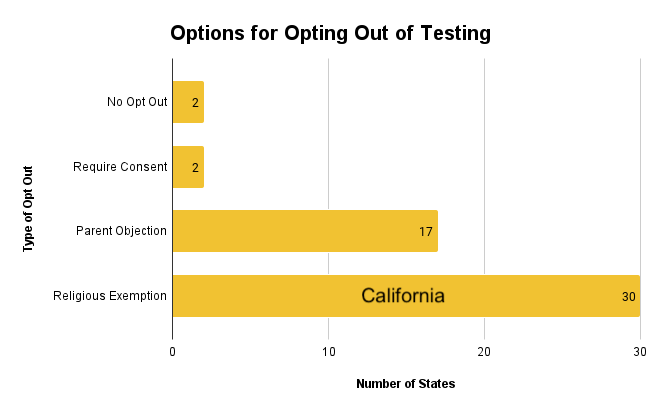
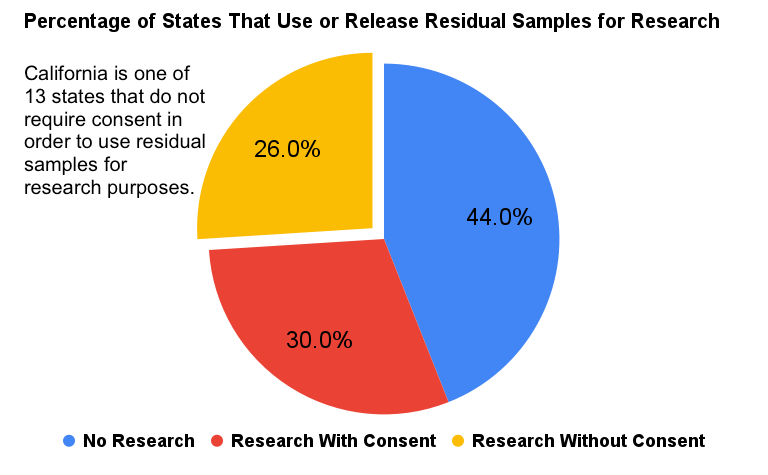
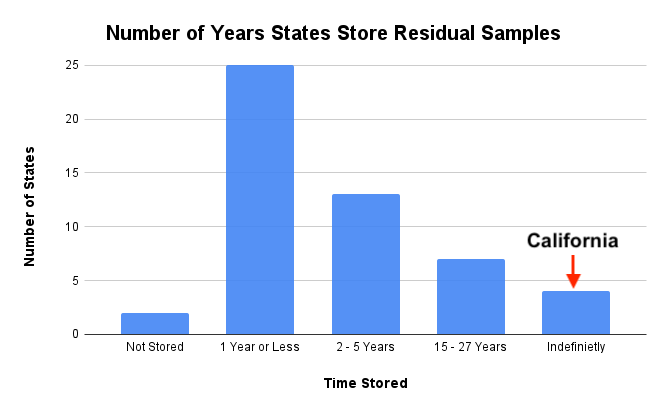
in the news
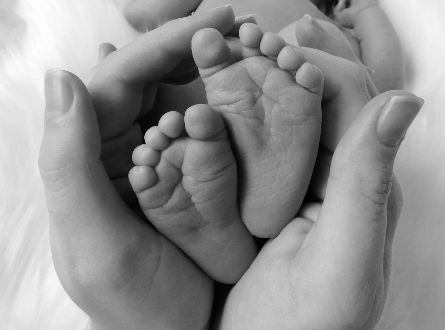
Genetic Privacy and Newborn Screening
Genetic privacy related to newborn screening is a growing concern across the united states. Here are some of the latest news articles.
Should you have the right to know that California is storing your child's DNA? Bill sponsors say, yes.
By Julie Watts, CBS News Sacramento.
California has been storing DNA from every child born in the state since the '80s, but most parents still have no idea. SB-625 would require that the state get written consent from parents before indefinitely storing their babies' newborn genetic bloodspot samples. Similar legislation failed in 2015, but that was before the Golden State Killer case changed our understanding of DNA. Read more here.
Newborns Get Routine Heel Blood Tests, but Should States Keep Those Samples?
By Michelle Andrews, KFF Health News.
Close to 4 million babies are born in the United States every year, and within their first 48 hours nearly all are pricked in the heel so their blood can be tested for dozens of life-threatening genetic and metabolic problems. The heel-stick test is considered such a crucial public health measure that states typically require it and parents aren’t asked for their permission before it’s done. Read more here.
Handle with Care: State Newborn Screening Policies
Approximately four million infants undergo newborn screening (NBS) each year in the United States. Shortly after birth, babies are tested for various rare and potentially fatal disorders, such as phenylketonuria, cystic fibrosis, and severe combined immunodeficiency. Generally, newborn screening includes collecting a blood sample through a heel prick, placing the samples on filter paper, and sending the samples to a laboratory for testing. Read more here.
